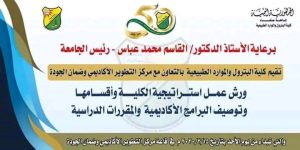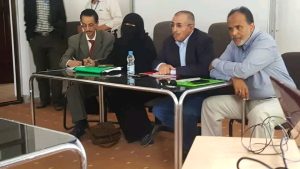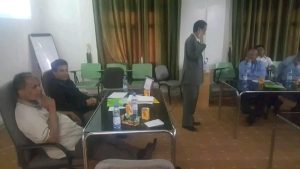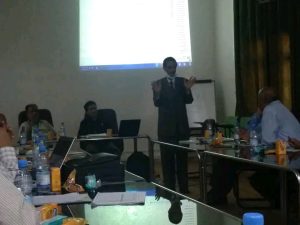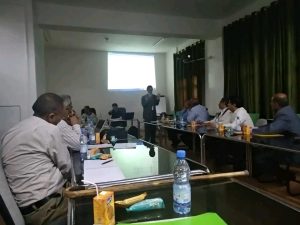Report on Training Workshops for Program and Course Specification at Faculty of Petroleum and Natural Resources
Under the patronage of the University Rector, Professor Dr. Al-Qassem Mohammed Abass, and with the participation of the Academic Development and Quality Assurance Center, the closing session for training workshops on program and course specifications for the Faculty of Petroleum and Natural Resources took place today, Monday, 6/4/2020, in the Academic Development and Quality Assurance Center’s Hall. The session was led by the expert trainer, Dr. Hilal Al-Qubati, Dr. Abdulwasei Ali Naji, the representative of the Academic Development Center, and Dr. Ahmed Al-Qadasi, Vice-Dean of the Center. Attendees included Dr. Baseem Al-Kherbash, Faculty Dean, Dr. Adel Al-Matari, Vice-Dean, faculty members, and 27 external specialists in the field of petroleum and natural resources.
The session reviewed key accomplishments from previous workshops. Discussions focused on aligning program learning outcomes, objectives, and content with similar programs in the field. The workshop trainer facilitated in-depth discussions to clarify the structure of the programs and corresponding study plans.
Following this, Dr. Al-Qubati provided a detailed explanation of the course specification document. He covered all sections, from course data to the evaluation process. Emphasis in the workshop was placed on:
- Articulating central course learning outcomes
- Linking course outcomes with program outcomes
- Selecting appropriate teaching methods and evaluation strategies
- Integrating learning outcomes with theoretical and practical course components
- Determining appropriate credit hours for each course
- Identifying necessary learning resources and references for each course
- Establishing essential guidelines for the teaching process
Through interactive discussions, the trainer addressed all participant inquiries and provided guidance on finalizing and reviewing the program and course specification documents for approval and endorsement.
Report of the Two PhD Program Specification Workshops
On Saturday, March 2, 2024, two review workshops were held in the Seminar Hall to discuss the program specifications for the Department of Earth Sciences and the Department of Environmental Sciences. These workshops were led by Prof. Bassim Shaif Al-Khirbash, the Faculty Dean, and attended by the following participants:
- Munasar Alsubari, Vice-Dean for Quality and Accreditation Affairs (Workshop Trainer)
- Prof. Adel Mohammed Al-Matari, Vice-Dean for Academic Affairs and Graduate Studies
- Prof. Khalid Mohammed Al-Salwi, Vice-Dean for Student Affairs
- Hisham Mohammed Naji, Head of the Environmental Sciences Department
- Prof. Ahmed Ali Al-Eidross, Head of the Earth Sciences Department
- Mohammed Abdullah Al-Wasabi, Faculty Member
- Ahmed Saif Al-Mikhlafi, Faculty Member
- Prof. Akram Qadri Al-Qurashi, Faculty Member
- Prof. Ibtisam Shamsan, Faculty Member
- Mariam Ahmed Taher, Faculty Member
- Aref AbdulJalil Al-Shamiri, Faculty Member
- Hajbi Ahmed Hajbi, Assistant Faculty Member
- Ali Saleh Al-Baz, Assistant Faculty Member
- Ibrahim Abdullah Al-Zubairi, Assistant Faculty Member
- Mohammed Bashir Al-Shami, Assistant Faculty Member
- Safwan Al-Samai, Assistant Faculty Member
With the participation of the leadership of the Academic Development and Quality Assurance Center represented by:
- Hoda Ali Al-Emad, Dean of the Academic Development and Quality Assurance Center at the University
- Prof. Ahmed Mohammed Mujahid, Vice-Dean of Academic Development and Quality Assurance Center
- Abdulwasei Ali Naji, Vice-Dean of the Faculty of Pharmacy for Quality Affairs and Head of the Development and Accreditation Unit at the Academic Development and Quality Assurance Center
- Ahmed Qaid Al-Mikhlafi, Secretary of the Development and Quality Assurance Center
The participants also included representatives from various institutions and the labor market, along with students and graduates.
Workshop Trainer Dr. Mansur Al-Sabbari began by outlining the workshop’s objectives, the concept of program specification, the steps involved in the specification process, the college’s graduate profile specifications, and the learning outcomes, all aligned with the National Accreditation Council’s template. Following this, the team responsible for gathering information from corresponding programs and preparing the program specification documents presented the specification documents of the two departments and their programs. The team comprised:
- Ahmed Saif Al-Mikhlafi, Coordinator of Earth Sciences Programs, presented the doctoral program specification document for the programs and courses of the Earth Sciences department, ensuring alignment with regional and global benchmarks as well as the National Accreditation Council’s template.
- Hisham Mohammed Naji, Head of the Environmental Sciences Department and Coordinator of the Environmental Sciences Program, presented the doctoral specification document for the Environmental Sciences Program, following the corresponding benchmarks and the National Accreditation Council’s template.
The presentations were followed by a lively discussion with interventions and suggested corrections to the program specification information and elements, which contributed to refining the specification steps, aligning the procedures, and enhancing their strengths based on the benchmarks, standards, and learning outcomes.
Once the initial presentations concluded, attendees were divided into two working groups based on their departmental affiliation (Earth Sciences or Environmental Sciences) and the PhD programs targeted for specification. The workshop aimed to review and refine the program specification documents, assimilate feedback from participants, and subsequently secure approval and ratification. This would enable the workshop leaders to submit the documents to the academic departments, which in turn would forward them to their respective councils for official approval and endorsement.
The workshop session concluded successfully at 2:00 PM.
Vice-Dean for Quality and Accreditation Affairs
Dr. Munasar Ali Alsubari
Report on the Two Workshops: “The Evaluation of Testing and Performance” and “The Standards of Quality Assurance and Accreditation”
On Tuesday, December 19, 2023, the Faculty of Petroleum hosted two workshops on “The Evaluation of Testing and Performance” and “The Standards of Quality Assurance and Accreditation” in the Faculty Hall. The sessions began at 9:00 a.m. and continued until 1:30 p.m. The workshops were inaugurated by the Faculty Dean, Prof. Bassim Al-Khirbash, who warmly welcomed all attendees, including faculty members, their assistants, and the entire administrative staff. Following the opening remarks, Dr. Munasar Al-Subari, the Vice-Dean for Quality and Accreditation, the workshop facilitator and trainer, presented the components of the workshop, which aimed to achieve the following objectives:
- Evaluating the performance system within the Faculty, including its departments and programs, with the aim of continuously improving and developing the academic programs.
- Enhancing the capabilities of faculty members by increasing their awareness of the best modern academic practices in the field of educational quality and accreditation.
- Briefing the Faculty leadership and faculty members on the latest global methodologies and approaches in building, managing, and developing academic programs.
- Promoting a culture of quality, continuous improvement, and development within the Faculty’s academic program construction, advancement, and management.
- Conducting a comprehensive evaluation of the Faculty’s current status to identify areas of weaknesses that need improvement for the sake of obtaining institutional and programmatic accreditation
The workshops covered a range of critical aspects that are fundamental to the essence and foundation of the educational processes, activities, and outcomes, as well as accreditation and quality standards. The sessions specifically focused on the following themes:
- The rationale behind performance assessment, quality assurance, and accreditation
- Mechanisms of academic performance evaluation
- Stages of performance assessment
- Evaluation of tests based on quality standards and their achievement of learning outcomes
- Mechanisms for measuring learning outcomes
- The Faculty’s quality system and the roles of its main and sub-committees in fulfilling accreditation and quality standards, and activating the documentation processes for all activities, regulations, guides, and documents
- Clarifying the self-assessment and accreditation requirements to prepare for future endeavors.
The workshop was structured into three sessions, each consisting of a blend of informative presentations and interactive exercises. The concluding session integrated training and evaluation activities. The workshop leaders and participants actively engaged together in applying the evaluation processes to realistically identify weaknesses and obstacles within the faculty’s departments, programs, and administrative and academic units. The goal was to develop appropriate solutions and proposals to address these challenges. The evaluation process focused on actionable improvements, acknowledging limitations while identifying areas where the faculty could make progress. Following the evaluation sessions, the committees identified several conclusions, with the most notable ones as follows:
- Inadequacy of training courses for faculty members and teaching assistants in areas such as evaluation and assessment methods, professional development, educational technology, and handling of academic course reports.
- Absence of both physical and electronic libraries and their various educational resources, which are important indicators of learning
- Insufficient training equipment in the faculty’s laboratories for educational programs
- Classrooms are lacking electronic teaching display screens that facilitate and enhance educational engagement
- A severe shortage of specialized technicians for the laboratories’ equipment and teaching resources in the faculty’s programs and departments.
- Lack of field trips necessary for students to gain practical knowledge related to their coursework.
- The shift towards fully automated testing undermines the complete achievement of students’ skills across different learning levels and final outcomes.
- There is a gap between theoretical knowledge and practical application due to insufficient training samples in the laboratories and due to the lack of sufficient field trips.
- Lack of teaching assistants in the faculty’s departments and programs.
- Regarding the feedback provided by some members about the tools for developing assessment, evaluation, and testing systems, as well as test evaluation scale, the following observations were made:
- Most of the statements in the forms, including those related to assessment/evaluation, are difficult to understand.
- As for the specific administrative difficulties listed in the schedule, some members commented on the lack of commitment by certain faculty members to the description.
- Two assessment scales were distributed to all workshop participants: one for evaluating multiple-choice questions and another for evaluating the procedures related to the development of assessment and examination systems. Participants were asked to select the appropriate statements based on their perspectives. Both tools will undergo an analysis process to derive suitable conclusions and recommendations for their utilization in the development and improvement of midterm and final exams, thereby enhancing the improvement of input and output learning skills.
On Wednesday, December 20, 2023, the committees formed in the workshops continued the works tasked by the workshop leadership. They discussed the evaluation forms for the elements that were presented in the workshops and assessed by the attending members, including faculty members and their assistants. The workshops intended to generate recommendations that would benefit the faculty and its educational programs, providing support for the development and improvement of educational processes and activities, as well as the quality and accreditation standards. This encompassed various aspects that are neccessary to meet the documentation standards and indicators, such as material resources, technological advancements, technical support, human resources, learning resources, and financial resources.
The workshops concluded with the following recommendations:
- Conducting intensive training courses for faculty members and teaching assistants in key areas such as assessment and evaluation, professional development, educational technology applications, performance evaluation, course report writing, and effective teaching and learning strategies.
- Establishing a well-equipped library with diverse learning resources in both physical and electronic formats, including books, references, scientific journals, periodicals, and research papers; activating the electronic library system with internet access; strengthening connections with relevant library networks; equipping the library with thirty computers.
- Requesting the University Rector to provide the faculty laboratories with the necessary equipment, training resources, and practical tools to effectively support the educational programs.
- Completely equipping classrooms with electronic smart screens due to their significant benefits in enhancing educational presentations and engaging both lecturers and students.
- Providing the faculty’s departments and programs with specialized technicians to operate, maintain, and conduct proper and beneficial training for students on laboratory equipment.
- Giving more attention to scientific field trips that allow students and faculty members to explore geological phenomena, natural resources, and rock formations, contributing significantly to their educational, research, and learning experiences.
- Re-evaluating the processes of preparing mid-term and final exams to ensure that assessments encompass all skill areas within the learning outcomes for each level, thereby guaranteeing graduates capable of meeting quality standards as the current reliance on automated tests has revealed weaknesses in student performance across various aspects of inputs and outputs.
- Implementing the academic course report across all levels, classes, and courses to enable monitoring the specification elements and their alignment with the course, educational process, learning outcomes, and assessment tools for performance evaluation, thereby moving away from reliance on random methods.
- Strengthening the connection between theoretical and practical aspects is crucial to enhance student learning and fulfill the requirements of learning outcomes.
- Providing students with a wider range of practical training samples in laboratories and evaluating the effectiveness of existing samples.
- Ensuring close alignment between Department objectives and program learning outcomes.
- Activating the role of faculty members in developing and improving evaluation and assessment processes for the program, its inputs, and outputs.
- Supplying programs and departments with teaching assistants and specialized faculty members, especially in programs facing a shortage of teaching staff to cover the deficiencies.
- Heads of departments must ensure that faculty members adhere to course specifications, apply assessment criteria, adhere to the defined schedules and hours, and report those who do not comply.
- Forming a working team to review and evaluate documentation processes and the availability of self-assessment indicators in programs, departments, and administrative units within the faculty to meet future accreditation requirements before the official assessment.
- The Faculty Dean should appoint an assistant faculty member, who possesses expertise in utilizing electronic analysis software, to analyze the two scales: the scale for evaluating the procedures related to developing evaluation and examination systems and the scale for evaluating test questions. The analysis results should then be shared with the Dean’s office as feedback to guide the development and improvement of examinations and test questions, ensuring that they meet quality standards and effectively assess all the learning outcome skills.
Vice-Dean for Quality and Accreditation Affairs, Workshop Facilitator and Trainer,
Dr. Munasar Alsubari

